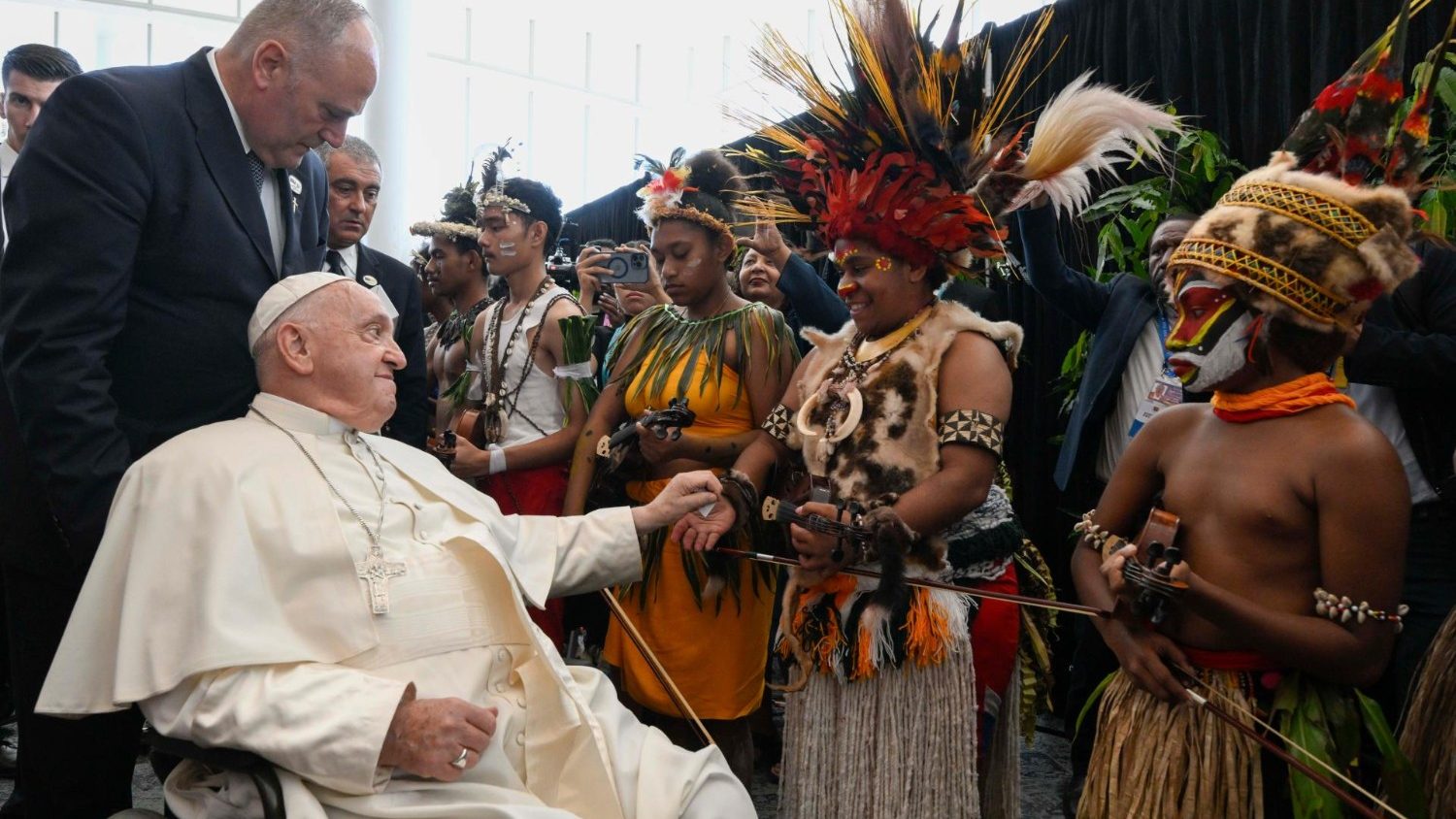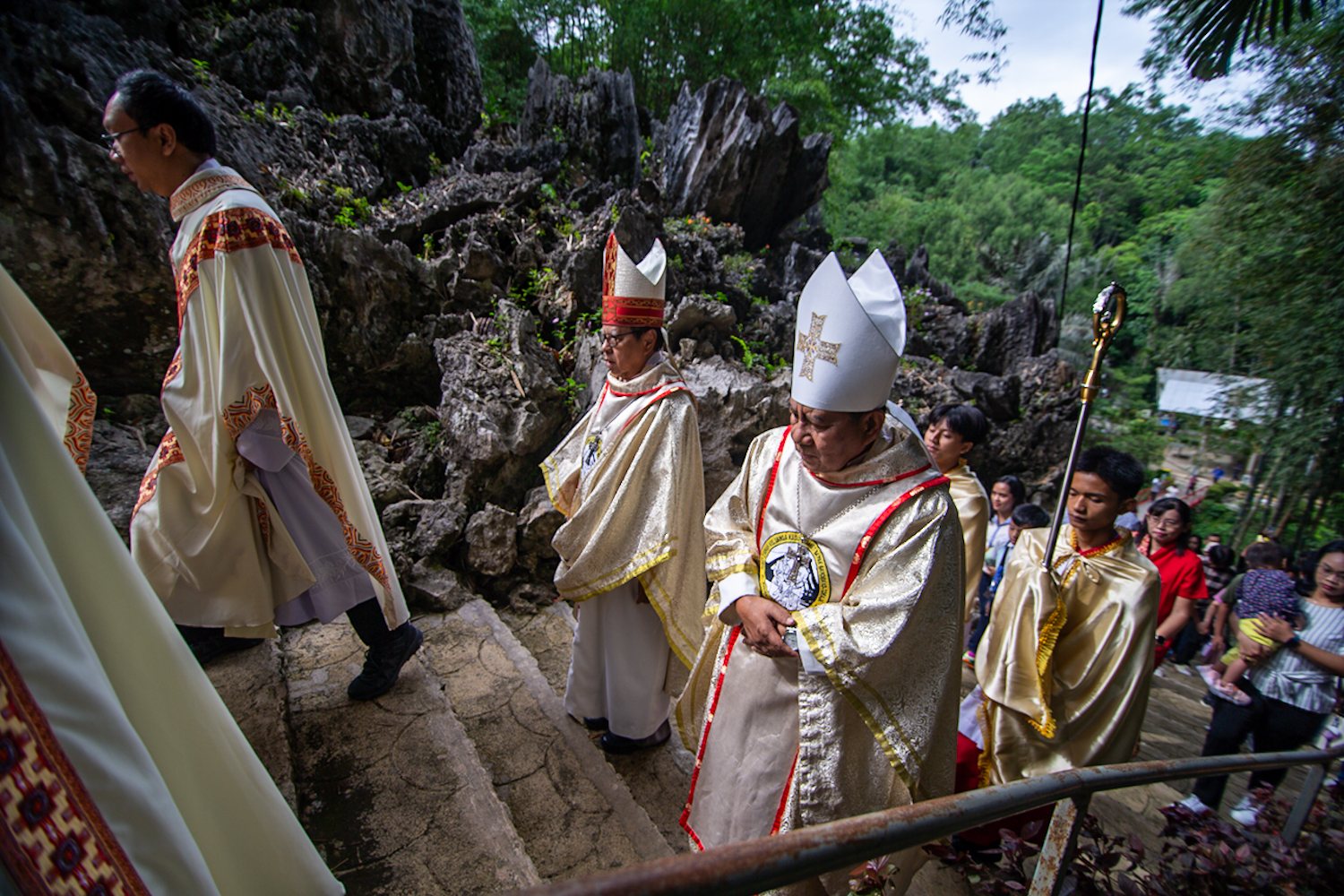Apostolic Journey in Oceania
Joaquim Magalhães de Castro
On the second leg of his 11-day apostolic journey to four nations in Asia and Oceania, Pope Francis thanked the Catholics of the town of Vanimo, in northwestern Papua New Guinea, for their warm welcome and urged them to spread “the beauty of the Gospel of Christ” and support ongoing missionary activities in that Pacific island nation. Earlier, Francis had held a private meeting with a group of missionaries at the Holy Trinity Humanistic School in Baro, a town near the border with the Indonesian part of Papua, officially known as the province of Irian Jaya.
Founded in 1964 by Passionist missionaries as a simple community school, the Holy Trinity Humanistic School now has more than 400 students, both in primary and secondary education.
Under strict security measures, thousands of Papuan Catholics traveled to Vanimo, joining the more than two hundred Indonesians – brothers in faith and ethnicity – who, armed with special authorization, were able to cross the border to have the privilege of attending the papal events. To the disappointment of many Catholics in the Indonesian archipelago, Francis’ visit (for obvious logistical and calendar reasons) was limited to the country’s capital.
It is worth noting, in the words of the local authorities, “the good behavior of the faithful”, a sign of efficient collaboration between the security forces and the Catholic Church. There were around 200 law enforcement officers deployed to the city and surrounding areas to ensure the safety of the Holy Father and the crowd that awaited him and fervently listened to him and prayed with him.
An Indonesian government official took the opportunity to praise the Catholic Church for its efforts “in favour of the well-being and livelihood of the people of Irian Jaya”, the country’s least developed province. The official expressed his gratitude directly to the priests and bishops who have contributed greatly to meeting some of the needs of the people in that region, particularly in terms of basic education, and who, through their social work, have helped to improve the standard of living of the local population.
This Indonesian man also highlighted – now as head of the Asmat Progress and Development Foundation – the role of the Catholic Church “in promoting throughout the world” Indonesia’s cultural diversity, thanks to the publication of books on the different Papuan ethnic groups, as well as the translation into several languages of manuscripts written over the centuries about that region. The term ‘Asmat’ is used to refer to both the people and the region where they live; a region that includes the Lorentz National Park, a World Heritage Site and “the largest protected area in the Asia-Pacific region”. The Asmat have one of the best-known woodcarving traditions in the Pacific, and their art is sought after by collectors from around the world.
In a speech to thousands of people (including clergy, religious and lay people) at the Cathedral of the Holy Cross in Vanimo, Francis praised the beauty of what the local Catholic community is doing, assuring his constituents that they “will never be left alone”. He reminded them that missionaries, including catechists, need the support of local people to carry out their work, which requires “balancing the demands of the mission with family responsibilities.”
The event was broadcast live on YouTube by EMTV, a Papua New Guinea news channel.
Francis spoke shortly after a testimony given by Steven Abala, a lay missionary catechist from St. Augustine Parish, Maka. Abala had asked for Francis’ blessing and prayers as he raised pertinent issues such as “the balance between missionary work and family” and the lack of availability of priests to ensure the viability of the most remote mission stations. In his homily, Francis recalled the arrival of Catholicism in Papua New Guinea, highlighting the role of the Marists and the missionaries of the Pontifical Institute for Foreign Missions (PIME). “The mission here has never ceased,” he said. Consecrated men and women, catechists and lay missionaries “have never stopped preaching the word of God and offering help,” whether through pastoral work, education, medical care and many other ways.
A student, a missionary nun and a family gave their respective testimonies of life and faith, with Francis praising “the pioneering efforts of evangelization” and the modern missionaries who traveled (and still travel) long distances in remote areas, with great difficulties, to preach the Gospel. “They faced many difficulties to be an instrument of peace and love for all,” said Francis, who considers the Papuans “experts in beauty,” certainly referring to the magnificent land where they live, blessed with a great variety of plants and birds that natural resources were given by God to Papuans so that they can live together in harmony with Him and with others, respecting the “common home” of all.


 Follow
Follow


